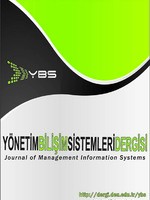EVALUATION OF DISTANCE LEARNING STUDENTS PERFORMANCE USING FUZZY LOGIC
EVALUATION OF DISTANCE LEARNING STUDENTS PERFORMANCE USING FUZZY LOGIC
___
- Arbaiy N., Z. bt Suradi and N. H. bt Yusoff “Fuzzy Approach for Student’s Performance Evaluation” International Conference on Islamic World, Information Technology and Information Society (IC3I 2006)
- Chen, G. and T. T. Pham (2001) “Introduction to Fuzzy Sets, Fuzzy Logic, and Fuzzy Control Systems.
- Dernoncourt, F. (2013), “Introduction to fuzzy logic”, franck.dernoncourt@gmail.com
- Gokmen G, T. Ç. Akinci, M. Tekta, N. Onat, G. Kocyigit and N. Tekta “Evaluation of student performance in laboratory applications using fuzzy logic” Procedia Social and Behavioral Sciences 2 (2010), 902–909.
- https://en.wikipedia.org/wiki/Membership_function_(mathematics) Wikipedia.
- Ibrahim Z. and D. Rusli “Predicting Students’ Academic Performance: Comparing Artificial Neural Network, Decision Tree And Linear Regression”, 21st Annual SAS Malaysia Forum.
- Kotsiantis S., C. Pierrakeas and P. Pintelas (2004) “Predicting Students' Performance In Distance Learning Using Machine Learning Techniques”, Applied Artificial Intelligence, 18:5, 411-426.
- Saxena N., K. K. Saxena,” Fuzzy Logic Based Students Performance Analysis Model for Educational Institutions”, IMS Engg College, Ghaziabad (UP)-INDIA *Corresponding Author’s email: neetesh.saxena@gmail.com.
- Yadav R. S. and V. P. Singh, (2011) ”Modeling Academic Performance Evaluation Using Soft Computing Techniques: A Fuzzy Logic Approach” International Journal on Computer Science and Engineering (IJCSE), 676-686.
- Yildiz O., A. Bal, and S. Gulsecen (2013) ”Improved Fuzzy Modelling to Predict the Academic Performance of Distance Education Students” International Review of Research in Open and Distance Learning, 144-165
- ISSN: 2630-550X
- Başlangıç: 2015
- Yayıncı: Vahap TECİM
Büşra ALMA, Erman COŞKUN, Naciye Güliz UĞUR
TÜRKİYE’DEKİ SEÇMEN EĞİLİMLERİNİN C4.5 KARAR AĞACI ALGORİTMASI İLE BELİRLENMESİ
Ali BAYIR, Şebnem ÖZDEMİR, Sevinç GÜLSEÇEN
EMERGING SCOPE OF MEDICAL LABORATORIES SYSTEMS USING CLOUD COMPUTING FROM END-USER PERSPECTIVE
Zeeshan RAFİ, Hasan DAĞ, Mehmet N. AYDIN
BİLGİ SİSTEMLERİ BAŞARI MODELİ İLE BİR E-ÖĞRENME SİSTEMİ DEĞERLENDİRMESİ
INTEGRATING INTERNET OF THINGS (IoT) INTO ENTERPRISES: SOCIO-TECHNICAL ISSUES AND GUIDELINES
Halil CİCİBAŞ, Kadir Alpaslan DEMİR
Abdullah EREN, Muhammed Dursun KAYA, Muhammed Dursun KAYA
Ahmet Kamil KABAKUŞ, Abdulkadir ÖZDEMİR, Serhat Ömer RENÇBER
Ersin KARAMAN, Gizem Dilan BOZTAŞ, Rabia BAY
